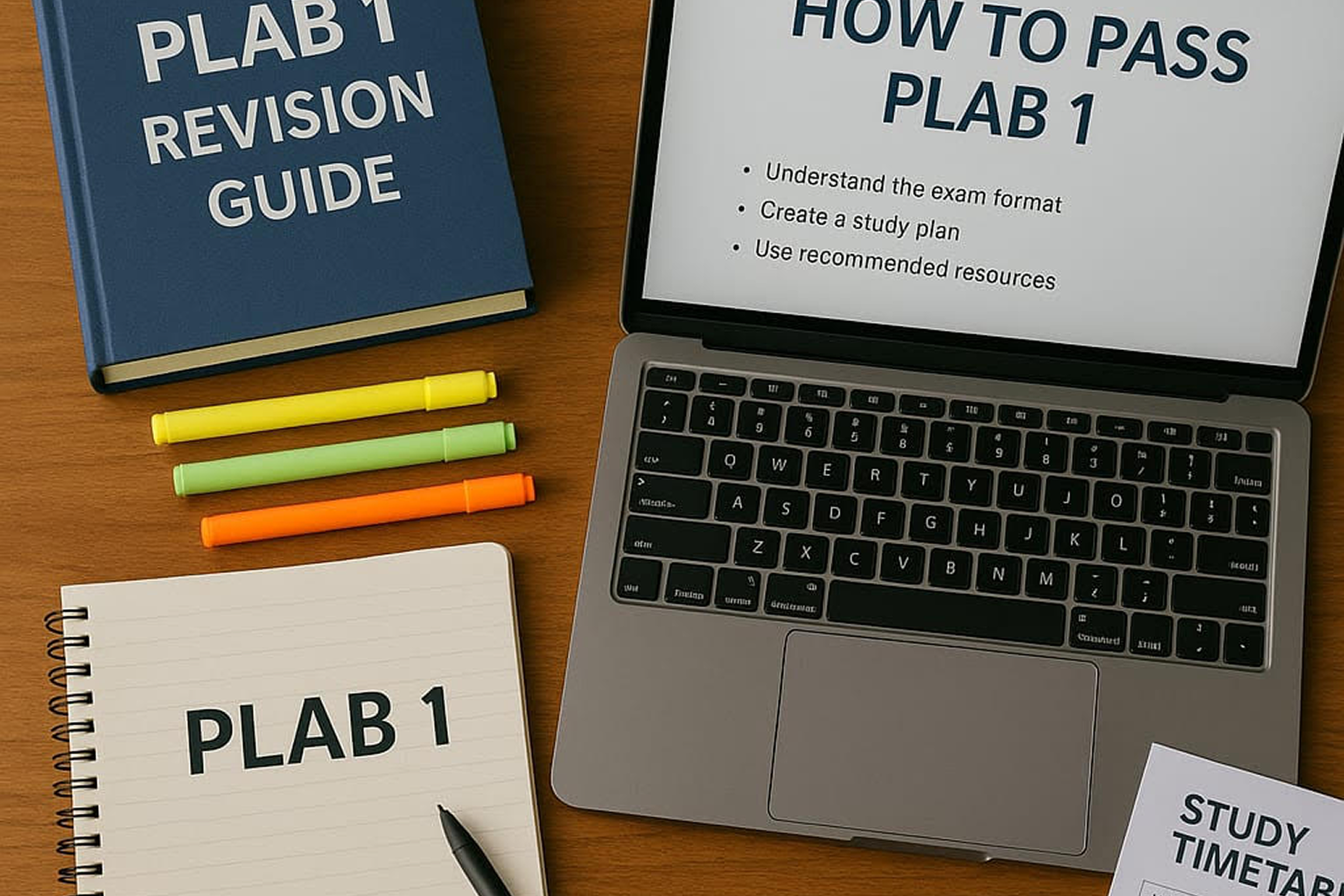 What Is the PLAB Exam?
What Is the PLAB Exam?
The PLAB exam is conducted by the General Medical Council (GMC) to assess if international doctors have the right knowledge and skills to work as a doctor in the UK at the level of a Foundation Year 2 (FY2) doctor in the NHS.
PLAB has two parts:
PLAB 1: Written test with multiple-choice questions (MCQs)
PLAB 2: Practical OSCE (Objective Structured Clinical Examination)
 Who Should Take the PLAB Exam?
Who Should Take the PLAB Exam?
You should take PLAB if you:
Are a non-UK, non-EEA, or non-Swiss medical graduate
Have a primary medical qualification accepted by the World Directory of Medical Schools
Have not completed an internship or postgraduate training recognized by GMC for direct registration
Additional Eligibility Requirements:
English proficiency (any one):
IELTS (minimum 7.5 overall, 7.0 in each band)
OET (Grade B in each section)
Proof of internship or house job (for full GMC registration later)
 PLAB Exam Format and Frequency
PLAB Exam Format and Frequency PLAB 1 – The Written Exam
PLAB 1 – The Written Exam180 MCQs based on clinical scenarios
3-hour duration
Conducted four times a year (March, June, September, November)
Held in UK and overseas test centers
 PLAB 2 – The Practical OSCE
PLAB 2 – The Practical OSCE16 clinical stations, each 8 minutes long
Tests communication, professionalism, and clinical skills
Conducted only in Manchester, UK
Must be taken within 2 years of passing PLAB 1
 Step-by-Step Guide to the PLAB Pathway
Step-by-Step Guide to the PLAB Pathway1. Create a GMC Online Account
Start by signing up at www.gmc-uk.org. Add your personal and qualification details.
2. Meet the English Language Requirement
Submit your IELTS or OET scores via the GMC portal.
3. Book PLAB 1
Once eligible, book your PLAB 1 exam (fee ~£255) at a center near you.
4. Pass PLAB 1 and Book PLAB 2
Once results are out, apply for PLAB 2 (fee ~£934). Slots fill up quickly, so act fast.
5. Apply for a UK Visit Visa for PLAB 2
You’ll need a Standard Visitor Visa to take PLAB 2 in Manchester.
6. Take PLAB 2 and Apply for GMC Registration
After passing PLAB 2, gather your documents and apply for full registration with a license to practice.
 PLAB 1 Preparation Strategy
PLAB 1 Preparation Strategy What to Study
What to StudyPLAB 1 covers clinical subjects aligned with UK medical practice, including:
Medicine
Surgery
Pediatrics
Psychiatry
Obstetrics and Gynecology
Ethics and Communication
Suggested 3-Month Study Plan
Month Tasks
1 Start with GATEIIT, PLABABLE and basic clinical subjects
2 Practice mock questions daily, identify weak areas
3 Take full-length mocks weekly and revise intensively
 Top Tips to Crack PLAB
Top Tips to Crack PLAB1. Start early and follow a structured plan.
2. Stick to UK-based clinical guidelines.
3. Use GATEIIT, PLABABLE and mock tests regularly.
4. Improve your communication and empathy for PLAB 2.
5. Record and review your OSCE practices.
6. Join support groups or coaching academies.
7. Stay updated via the GMC website and forums.
8. Practice time management—especially during mocks.
9. Take care of mental health—balance study and rest.
10. Keep all documents organized and ready for visa/GMC.
FAQs About the PLAB Exam
Q: Can I take PLAB more than once?
Yes. You can attempt PLAB 1 up to 4 times, and PLAB 2 up to 4 times as well.
Q: Is coaching necessary for PLAB 2?
Not mandatory, but highly recommended due to the OSCE nature.
Q: How long is my PLAB 1 pass valid?
PLAB 1 results are valid for 2 years to appear for PLAB 2.
Q: Can I get a job immediately after PLAB?
Yes, after GMC registration, you can apply for Foundation Trusts or non-training posts.
 How GATEIIT Helps in PLAB Preparation
How GATEIIT Helps in PLAB PreparationGATEIIT (Gate Indian Institute of Tutorials) is one of India’s leading coaching institutes, known for its expert mentorship and structured programs for international medical exams like PLAB 1 and PLAB 2.
Here’s how GATEIIT supports aspiring PLAB candidates:
 1. PLAB 1 Coaching
1. PLAB 1 CoachingOffers comprehensive online and classroom training based on the latest GMC syllabus
Provides topic-wise lectures, MCQ practice sessions, and access to PLABABLE-style questions
Personalized doubt-clearing sessions with experienced medical faculty
Focus on clinical reasoning, ethics, and UK healthcare scenarios



